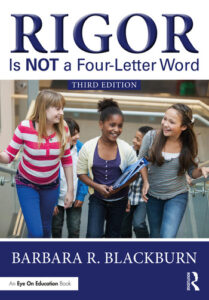[ad_1]
By Barbara R. Blackburn

It’s the start of a new school year, and you are 100% excited about making a difference for kids! Now, take a sheet of paper and cut out a heart (yes, red paper would be nice).
And now, I want you to imagine all types of things that may happen this year.

You read the 50th news story about how teachers don’t work hard. (Go ahead, rip off a piece of the heart and throw it on the floor. That’s how it will feel, right?)
You pour your heart and soul into the student everyone said was a lost cause, only to have the parents come to school and berate you for not doing enough. (Rip off another piece.)
A teacher tells you it was nice that you had all these ideas about helping kids but that it’s really all about the test scores. (Rrrrrrrrip!)
You are told that you can’t use any books that aren’t “traditional” because this community wants it that way. (Rrrrip.)
Wow! How much of your heart is left? You may feel like you need a heart transplant. I had periods of time when I felt disheartened, particularly at the end of my first year of teaching. I also had days when I started the morning full of energy and passion and excitement, but by 10 a.m. the problems dragged me down.
There were days when it seemed like it didn’t really matter if I tried, put forth extra effort, did a really great activity instead of a worksheet, or tried for the hundredth time to reach that student. I tried to make a difference, but Roger still got in a fight. I did everything possible, but Asheland still didn’t bring her homework. I communicated with parents, but they still said it was my fault that their child wasn’t learning.
“Am I making a difference?”

You will likely have days when you ask, “Is it worth the effort? Am I making a difference?” Let me assure you, you do make a difference. However, one of the most difficult aspects of being a teacher is that we sometimes don’t see the results of our efforts.
It’s like planting an apple tree in your backyard and then discovering you are moving away. Full growth won’t be evident until after you are gone. You dug the hole, planted the tree, watered it, added fertilizer and some TLC, but because it takes years for an apple tree to grow to full height, someone else will enjoy the apples.
Teaching is exactly like that. You invest lots of time, energy, and passion today, but you have to trust that the fruits of your labor will flourish sometime in the future. You do the work and you trust there is a benefit in the future. It’s important that every single day, you keep the faith.
Your kids watch you; they read your moods; and they notice what you wear, what you say, and even sometimes what you think! And every single day, every single moment, remember, “On your worst day, you are still someone’s best hope.” You are still their teacher. You – and you alone – are the key to someone learning today.
Attention must be paid.

Also remember that just like your heart is sometimes torn, so are the hearts of your kids. Their hearts are torn by things like mom or dad yelling at them; being late for the bus and having to find a way to get to school; another kid laughing at them because their shirt isn’t the cool one; not getting breakfast; not getting enough sleep because dad and his girlfriend had a fight; having to take care of a two-year-old sibling because mom is working two jobs; not getting homework done because there wasn’t time to go to the library after work…. The list is endless.
For those students you may be the only person who says they are good at something. You may be the only person who asks, “What do you think?” You may be the only one who asks, “How can I help?” You may be the only person who says, “Great job!” You may be the only one who says, “No, that wasn’t right, but I know you can do it if you try again.”
You are the thermometer for your classroom; your students’ temperatures rise or fall based on what they see happening with you. Find the energy to make those extra efforts with your students. Your energy, excitement, and enthusiasm will drive the levels of your students. Make the decision to take one action every day to positively impact your students:
✻ Smile today, even if you don’t feel like it.
✻ Find your quietest students and ask about their days.
✻ Say something positive about your worst student.
✻ Refuse to allow “I can’t” to be uttered by anyone, including yourself.
Then, when that’s working, decide to do two things, then three, and then you’re on such a roll that you can’t stop yourself (and really, you are the only one who can).
Holding the keys to your classroom
Do you feel like you are told by everyone else what to teach, when to teach, and how to teach? I understand. But figure out how to make a difference within that environment anyway.
Even if you have to follow a script, you choose your level of enthusiasm, your voice tone, and your facial expressions. If you can’t take a field trip because of regulations, bring one into the classroom through technology, video, or guest speaker. Do you feel like there’s so much emphasis on testing that you don’t get to do anything fun? That simply isn’t true. Fun is a state of mind.

Deciding whether or not you want to be the key isn’t a choice – you are the key for your students. Your choice is whether you want to be a bright, shiny key that opens new doors of learning for your students or a rusty key that is worn down by all the problems.
And it is your choice every single day, every single moment. In a flash of a second, you choose to smile or frown, breathe deeply or yell, hand out a worksheet and make everyone sit and write silently – or allow students to work on a project.
It’s the start of the year, and you may not need this encouragement today. But you likely will at some point this year. So bookmark this article, and when you need to hear some positive reinforcement, come back to this. And just know that you make a difference every day, even when you don’t feel like it.
Seated boy image by Urhan TV from Pixabay
 Barbara R. Blackburn, a “Top 30 Global Guru in Education,” is a bestselling author of over 25 books and a sought-after consultant. She was a successful classroom teacher and an award-winning professor at Winthrop University and has taught students of all ages. In addition to speaking at conferences worldwide, she regularly presents virtual and on-site workshops for teachers and administrators. Barbara is the author of Rigor and Differentiation in the Classroom: Tools and Strategies and Rigor is NOT a Four-Letter Word from Routledge/Eye On Education.
Barbara R. Blackburn, a “Top 30 Global Guru in Education,” is a bestselling author of over 25 books and a sought-after consultant. She was a successful classroom teacher and an award-winning professor at Winthrop University and has taught students of all ages. In addition to speaking at conferences worldwide, she regularly presents virtual and on-site workshops for teachers and administrators. Barbara is the author of Rigor and Differentiation in the Classroom: Tools and Strategies and Rigor is NOT a Four-Letter Word from Routledge/Eye On Education.
[ad_2]
Source link
Related posts
Today's pick
Recent Posts
- The Road Less Paved: An Introduction to Gravel Biking – Steven Rindner
- DIY Moving vs. Professional Movers: Navigating the Best Path for Your Relocation – Safe Ship Moving Services
- The Debt Ceiling and Technological Innovation: Navigating Future Frontiers – Kavan Choksi
- The Federal Reserve: Navigating Business Impacts – Kavan Choksi
- Embracing Community: The Ascendance of Multifamily Living – Kanat Sultanbekov
Archives
Categories
| M | T | W | T | F | S | S |
|---|---|---|---|---|---|---|
| 1 | 2 | 3 | 4 | 5 | 6 | 7 |
| 8 | 9 | 10 | 11 | 12 | 13 | 14 |
| 15 | 16 | 17 | 18 | 19 | 20 | 21 |
| 22 | 23 | 24 | 25 | 26 | 27 | 28 |
| 29 | 30 | |||||
